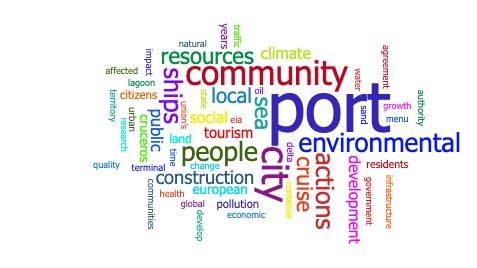By Francesca Savoldi

Fixities and flows in port cities are particularly influenced by extra-local and global processes. These multi-scalar relationships and interactions produce distinctive spaces, discourses and geometries of power.
Over the last 50 years ports have become increasingly larger, with impenetrable, privatized and automatized infrastructure altering the port-city relationship. Driven largely by the reorganization of global maritime transport, this evolution has been seen in several contexts, producing different governance models and causing socio-spatial disconnections between port and city. As port sizes and operations scale up, so have the socio-environmental impacts and localized competition of limited resources.
The many social mobilizations taking place against projects of port expansion are symptoms of these new structural imbalances at a time of climate crisis. This is made visible by the narratives collected by the online platform ContestedPorts.com, through which active citizens are sharing contestations against the multidimensional toxification of the environment, territorial encroachments and overall, the port’s generalized and political “invasiveness”.
This situation is often interpreted as a dilemma that faces off between two difficult choices: prioritising the port’s needs, and so the adoption of a metabolism driven by its modality of growth, or the respect for citizens and their environment, which is a tempering of the idea of limitless growth. Illuminating new paradigms of coexistence then becomes an urgent theoretical and practical task in times of economic restructuring and planetary change. This ‘dilemma’ can be expounded through approaches from political ecology.
Mexican environmental sociologist Enrique Leff defines political ecology as “the study of power relations and political conflict over ecological distribution and the social struggles for the appropriation of nature” (Leff, 2015 p.30). As a disciplinary field with broad, interdisciplinary scope, it also has a complex genealogy. The political foment and emerging environmental critiques of the 1960s and 70s saw inquiries into socio-environmental conflicts generated by capitalist appropriation of nature. Building on this, American geographer Michael Watts (1983), and Scottish geographer Piers Blaikie (1985) among others, integrated ecological concern with a broadly defined engagement with political economy. Political ecologists have since played an essential role in deconstructing theories and narratives that take for granted the imbalance of stakeholders in shaping modes of governance. Several notable case studies have shown the fallacy of the “tragedy of the commons”, related Malthusian thinking and the destructiveness of the green development paradigm (Helmcke, 2022). This approach allows for the identification of scalar interrelations between humans and the environment, the past and the present, and the global and the local (Blaikie & Brookfield 1987). For the port-city context, this enables a much-needed, multi-scalar approach to what the share of power relations and interactions are between local and distant spaces (Benjaminsen and Svarstad, 2021).
From this perspective, the relationship between society and the environment is political, because the exercise over nature and the processes of its appropriation are effects of power strategies, guided by differentiated and often conflicting values, interests and rationalities (Leff, 2015). Crossing post-structural, deconstructionist, constructivist, postcolonial and after-nature studies (Escobar, 2008) the production of knowledge around the environment can be enhanced through critical social theory. Three fundamental assumptions developed by British geographers Raymond Bryant and Sineád Bailey (1997) can summarize political ecological praxis:
- Cost and benefits associated with environmental change are distributed unequally, depending on political, social and economic differences.
- This unequal distribution reinforces or reduces existing social and economic inequalities.
- The unequal distribution of costs and benefits and the reinforcing or reducing of pre-existing inequalities holds political implications in terms of the altered power relationships that now result.
The methodological commitment of political ecology to in-depth, direct observation, involving ethnographic qualitative and quantitative methods, historical documentary and archival analysis, as well as GIS spatial analysis and surveys, makes it pluralistic and case-driven – key to the study of port cities and their historical and geographical complexities. Looking at the port-city through the lens of political ecology invites deeper understandings of the interplay of environmental, economic, political and social factors, particularly as port activities do not affect the entire city and all groups of citizens the same way. Focusing on the problem of cost and benefit distribution in the port-city can then expose conflicts of interests and values, as well as the path-dependency of spatial injustice and environmental degradation. The power dynamics that underlie the port city’s tight, opaquely managed bundle of relationships also need investigating at a time of shipping’s spatial and financial reformulation, which is altering power geometries. Shining a light on who has decision-making power gives indications as to the reasons for certain positions, particularly ‘dilemma’ narratives, that remain more dominant than others.
References
Benjaminsen, T.A. and H. Svarstad (2009) “Qu’est-ce que la ‘political ecology’?” Natures Sciences Sociétés, Vol. 17, pp. 3–11.
Bryant, R.L. and S. Bailey (1997) Third World Political Ecology. London: Routledge.
Helmcke, C. (2022) “Ten recommendations for political ecology case research” Journal of Political Ecology Vol. 29, 2022
Watts, M.J. (1983) Silent Violence: Food, Famine, and Peasantry in Northern Nigeria. Berkeley: University of California Press.
Blaikie, P. (1985) The Political Economy of Soil Erosion in Developing Countries. London: Routledge.
Leff, E. (2015) The power-full distribution of knowledge in political ecology: a view from the South, in The Routledge handbook of political ecology, Ed. Perreault, T. Bridge, G. and McCarthy, J. 2015. Routledge: New York
Escobar, A. (2008) Territories of Difference: Place, Movements, Life, Redes. Durham, NC: Duke University Press.
